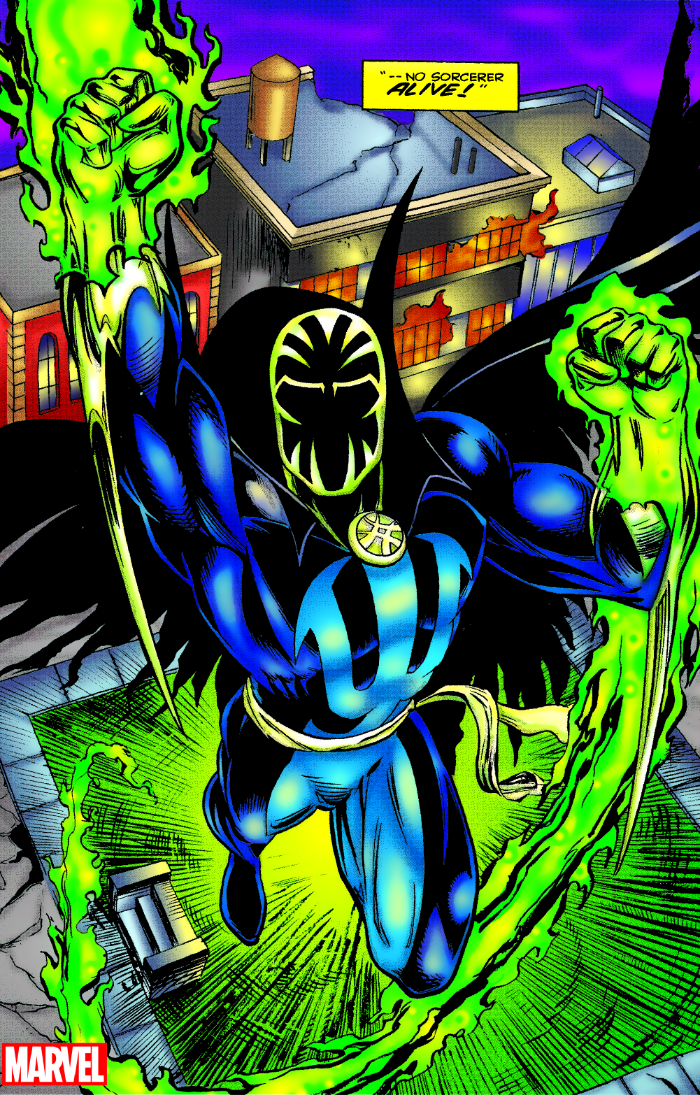
Doctor Strange, Sorcerer Supreme, Omnibus Vol. 3
Written by David Quinn ’82, among others
Marvel
In modern comic books, it’s common for creators to move from independent original work to corporate gigs, but that wasn’t nearly as easy in the 1990s. So it’s something of a feat that writer David Quinn ’82 was recruited to take over Marvel Comics’ Doctor Strange, Sorcerer Supreme in 1993, after achieving underground success with his adult-oriented supernatural series Faust: Love of the Damned, co-created by artist Tim Vigil. In a note to readers at the back of his second Doctor Strange issue, Quinn promises to bring his outsider sensibility to one of Marvel’s most venerable characters. “Comics set firmly in the heroic mainstream can still lead us into danger,” he writes, “and I don’t mean mere carnage.”
That issue and all of Quinn’s Doctor Strange stories are included in the massive collection Doctor Strange, Sorcerer Supreme, Omnibus Vol. 3, along with work from a number of other writers. Quinn’s contributions take up nearly two-thirds of the 1,000-plus pages, and they represent a curious tension between his ambitious creative ideas and the limitations of mainstream superhero comics in the ’90s. Quinn’s first issue happens to be the seventh part of a 17-issue crossover with several other series, and that makes it tough for him to establish his own voice right away.
Even dropped into the middle of a multicharacter storyline, Quinn starts laying groundwork for his reinvention of Doctor Strange, the master of the mystic arts created by Stan Lee and Steve Ditko in 1963. Quinn introduces a major adversary for Strange in the form of the sorceress Salomé, who will soon usurp Strange’s title of Sorcerer Supreme. Her threats to Strange are often laced with erotic innuendo, in just one example of Quinn’s efforts to bring some of Faust’s explicit sensibility to a mass-market publication.
There’s a kinky vibe to Strange’s relationship with the evil—or maybe just misguided—spawn of Lilith known as Sister Nil, whom he keeps as a bound and masked captive after defeating Lilith’s army. In one of his later issues, Quinn brings in a pair of sex workers in nurses’ outfits who show up to offer “punishment” to Strange’s alter ego Dr. Vincent Stevens. It’s all quite tame compared to the graphic sexuality in Faust, but it pushes boundaries in ways that few other mainstream creators were attempting during that period.
Narratively, Quinn’s stories are more in line with other ’90s superhero comics, which were often fixated on edgy new versions of longstanding characters. After Strange surrenders his title to Salomé, he creates two magical avatars of himself, one a wealthy playboy, the other a masked vigilante. Those characters dominate the stories while Doctor Strange himself remains trapped in his underground sanctuary, too weakened to venture into the outside world. Quinn uses those avatars to explore the idea of the typically arrogant sorcerer taking responsibility for his often rash actions, a theme later picked up by the comparatively streamlined Doctor Strange movies.
From the start, Quinn brings his outsider sensibility to a venerable Marvel character.”
Quinn’s Doctor Strange eventually adopts a look with long hair and John Lennon–style sunglasses, taking over the corporate position of his playboy avatar and evolving into a sort of mystical Bruce Wayne. Quinn’s run on the series ends abruptly, though, with many of his ideas left unexplored or quickly undone by later writers. He’s also hampered by constantly shifting artists, who rarely stick around for more than an issue or two. Kyle Hotz and Peter Gross best capture the psychedelic tone of Quinn’s writing, showing a potential for experimentation that’s never quite realized.
Quinn returned to his own independent work after his Doctor Strange stint, but this collection offers a glimpse into an alternate world of popular superhero comics infused with his transgressive values.
Illustration courtesy of Marvel Comics